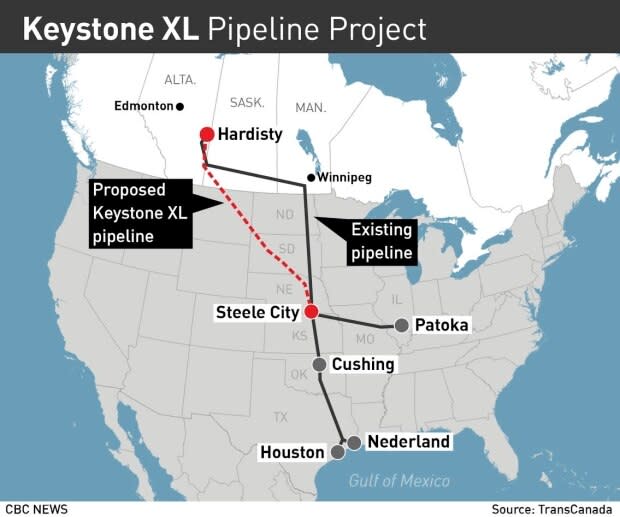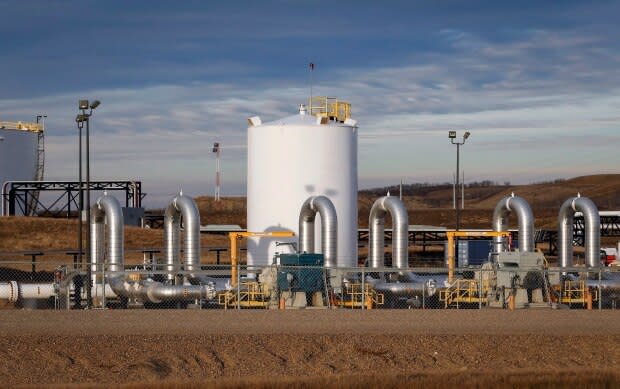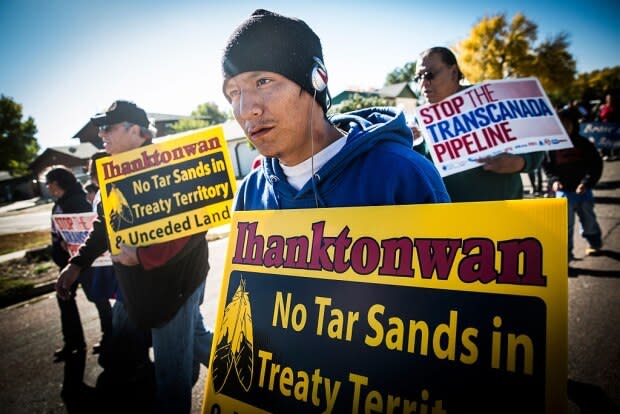How the American environmental movement dealt a blow to Alberta's oilpatch
The strategy to stifle Alberta's oilsands came together in a hotel near a mall in Minneapolis over a decade ago.
It was the fall of 2008, and a group of environmental activists spent part of a conference there brainstorming tactics for slowing down the growth of the oilsands — and they identified pipelines as the most vulnerable target.
One in particular fit the bill: Keystone XL — a 1,897-kilometre pipeline to be built by TC Energy that would carry up to 830,000 barrels of crude oil per day from Hardisty, Alta., to Nebraska, where it would link up with the company's existing pipeline network.
Their fateful decision at that meeting to throw money and organizational effort into attacking the proposed pipeline opened a difficult new chapter for the oilpatch.
Now, those activists are claiming victory.
A decade later, Alberta crude is increasingly choked off from international markets; growth forecasts have been cut in half; iconic Canadian energy companies are rebranding themselves or moving head offices; and parts of Western Canada are simmering with talk of separatism.
'Keystone was a turning point'
Several American activists interviewed in recent days cited the tactical decisions made in 2008 as setting the stage for the industry's current woes.
"Keystone was a turning point," said Kenny Bruno, an organizer and author in the environmental movement who helped shape the anti-pipeline strategy.
"It really did impact the industry — as we intended."
Anthony Swift, director of the Canada Project at the Washington-based Natural Resources Defence Council (NRDC), agrees that the effort helped at least curb growth even if, overall, oilsands output continues to rise.
"We really did stop expansion," Swift said.

While delays in large oil projects are now fairly common, in 2008, it was near inconceivable that the United States would reject a pipeline — especially one from Canada, Swift said.
In November of that year, activists reviewed the protest methods employed up to that point and concluded they needed new tactics.
Bruno said they talked about protesting at refineries or lobbying industrial users such as shipping companies that might be using fuel sourced in Alberta.
The problem with targeting refineries and companies, however, was there were so many of them that altering the behaviour of one would have a limited impact. Isolating Alberta oil within a company's fuel supply was also impractical, Bruno said.
But when it came to pipelines, at the time, there were only a few major cross-border projects in the works.

Pipeline still in limbo
Bruno, a New Yorker who has worked for a number of climate NGOs, including Oil Change, Greenpeace and Corporate Ethics, was among those advocating the view that stalling just one pipeline could do disproportionate damage to the industry.
He and others at the meeting identified the one pipeline project furthest from completion — Keystone XL, for which a permit application had been submitted just weeks earlier, and they zeroed in on it as their target.
"We felt, first of all, that it was linchpin infrastructure for the expansion," said Bruno. "And second, because there were only a few pipelines, if you could stop one, it would be a big deal.… For the first few years, I assumed we were going to lose the campaign. But, you know, I'm a New York Mets fan. You still fight."

Environmental groups had contested various aspects of oilsands expansion over the years, including previous pipeline projects and ecological impacts, such as deforestation.
What changed at the 2008 meeting, however, was the decision to co-ordinate efforts and throw all of their energy at stopping one project, said Susan Casey-Lefkowitz, a chief program officer with NRDC who attended the meeting.
And it worked, she said.
"At that time, [Alberta oil] was seen as the next Gold Rush. Every major oil company in the world was there," she said. "That's changed. and it's changed for several reasons."
Eleven years later — after numerous court battles, protests along the planned route and outside the White House and several delays, including one rejected presidential permit from then-president Barack Obama — Keystone XL remains in limbo.
Several other pipeline projects have been subsequently stalled in the U.S. and Canada while others have either been cancelled or simply abandoned.
Drag out and delay
An organizer of the first big Washington protest against Keystone XL, Bill McKibben, said the conflict over that pipeline created a template for future challenges.
He described the broader strategic goal this way: drag out and delay fossil-fuel projects and make them more expensive while alternative energy gets cheaper.
"Nothing gets built for free anymore, without a lot of resistance," said McKibben, founder of the group 350.org, who has more recently turned his focus to contesting banks that fund oil projects.

"Sometimes, we win those fights; sometimes, we lose them. But even when we lose them, if you delay these projects a year or two years or three years, that's the time the engineers need to drop the cost of a solar panel or a wind turbine another 10, 15, 20 per cent. And the economics [for investing in oil] gets worse and worse and worse."
It would be a wild exaggeration to say these activists have achieved all their goals.
Global emissions are up and show no sign of peaking as they continue to surge in China. U.S. oil production has more than doubled in several years.
Even Canadian oilsands production is up — it's practically doubled over the past decade.
One Canadian pipeline project, Enbridge's Line 3, is close to completion. The Trans Mountain expansion and Keystone XL are still in the works.
So, can international climate activists really claim to have put a dent in Canada's oilsands?
"I don't think they're wrong at all," said Andrew Leach, an energy economist at the University of Alberta. "It's massive.… It's made a huge difference."
The tactics might arguably be ineffective as a policy to slow down climate change — but, he said, it's impossible to deny the protests against Keystone XL helped restrain Canada's pipeline capacity, and the shortage of capacity is one of several factors bedevilling the oilsands.

Legal and other challenges pending
Despite U.S. President Donald Trump's decision to revive the pipeline project, Keystone XL's problems aren't over yet.
It still faces court challenges in Montana from several Native American tribes and environmental groups as well as opposition in Nebraska from dozens of landowners.
Activists' newest strategy on Keystone XL is to delay the project beyond Trump's first term and hope a Democratic president might cancel the permit in 2021.

TC Energy, formerly known as TransCanada, said in a recent earnings call that it remains committed to the pipeline, which would take about two years to build.
"There's just no way they're going to have this [Keystone XL] pipeline built before a new president is elected," said Nebraska activist Jane Kleeb, founding director of the advocacy group Bold Nebraska.
Kleeb was instrumental in connecting national climate groups with landowners fighting Keystone XL in her state.
"People long before me … really planned out that if we stopped Keystone XL … that we would then start to constrain the production altogether," Kleeb said.
I think what they're really angry at is physics and chemistry. We can't take all the carbon that Alberta would like to sell to the rest of the world. - Bill McKibben, environmental activist
"That's a major accomplishment that, quite frankly, I don't think anybody fully grasps. They think we were just fighting one pipeline."
Vivian Krause sees it differently. The Canadian has earned a name writing and lecturing critically about U.S. financing of Canadian environmental charities and says the protests have done nothing to help the planet and lots to enrich the protest movement as an industry.
Krause, who maintains a blog called Fair Questions, said she's compiled tax records showing that one organization alone, the Rockefeller Brothers Fund, has spent $4.5 million in grants since 2007 on the Tar Sands Campaign and that money flowed to the NGOs opposing Keystone XL.

She said she began compiling the financial data as a hobby but now gets paid to deliver presentations to companies in the energy, banking and business sectors, among others.
If environmental groups cared about greenhouse gases, Krause said, they would have moved on from fighting Alberta after the provincial NDP government of Rachel Notley implemented emissions caps.
"Why are you still pounding Alberta?" she said. "It hasn't kept oil in the ground. … I think it's a flawed strategy."
She said the main effect of the fights over pipelines has been to encourage energy investment in the United States rather than Canada.
U.S. activists inspired by Canadian opposition to oilsands
The American groups insist they're fighting projects wherever they can — and not singling out the oilsands, as the Alberta government accuses them of doing.
Kleeb said she feels sympathy for Alberta oil workers who won't be able to rely on Keystone for jobs but has no regrets about her cause.
In her view, delaying the pipeline has safeguarded Nebraskans' property rights and forced necessary conversations about the future of energy.
Swift and McKibben also take exception to an oft-repeated suggestion that it has been primarily Americans who are leading the fight against Canadian oil.

Swift, McKibben, Bruno and Casey-Lefkowitz all said they first heard concerns about oilsands expansion in the 2000s from Indigenous and environmental activists in Canada.
"These are the heroes of this story," said McKibben, who used to live in Canada and even went to grade school with former prime minister Stephen Harper.
He dismissed some of the frustration in the oilpatch as a "tantrum" stemming from having to confront the reality that it's impossible to meet global emissions targets and still fully develop the oilsands.
"I think what they're really angry at is physics and chemistry," he said. "We can't take all the carbon that Alberta would like to sell to the rest of the world."


